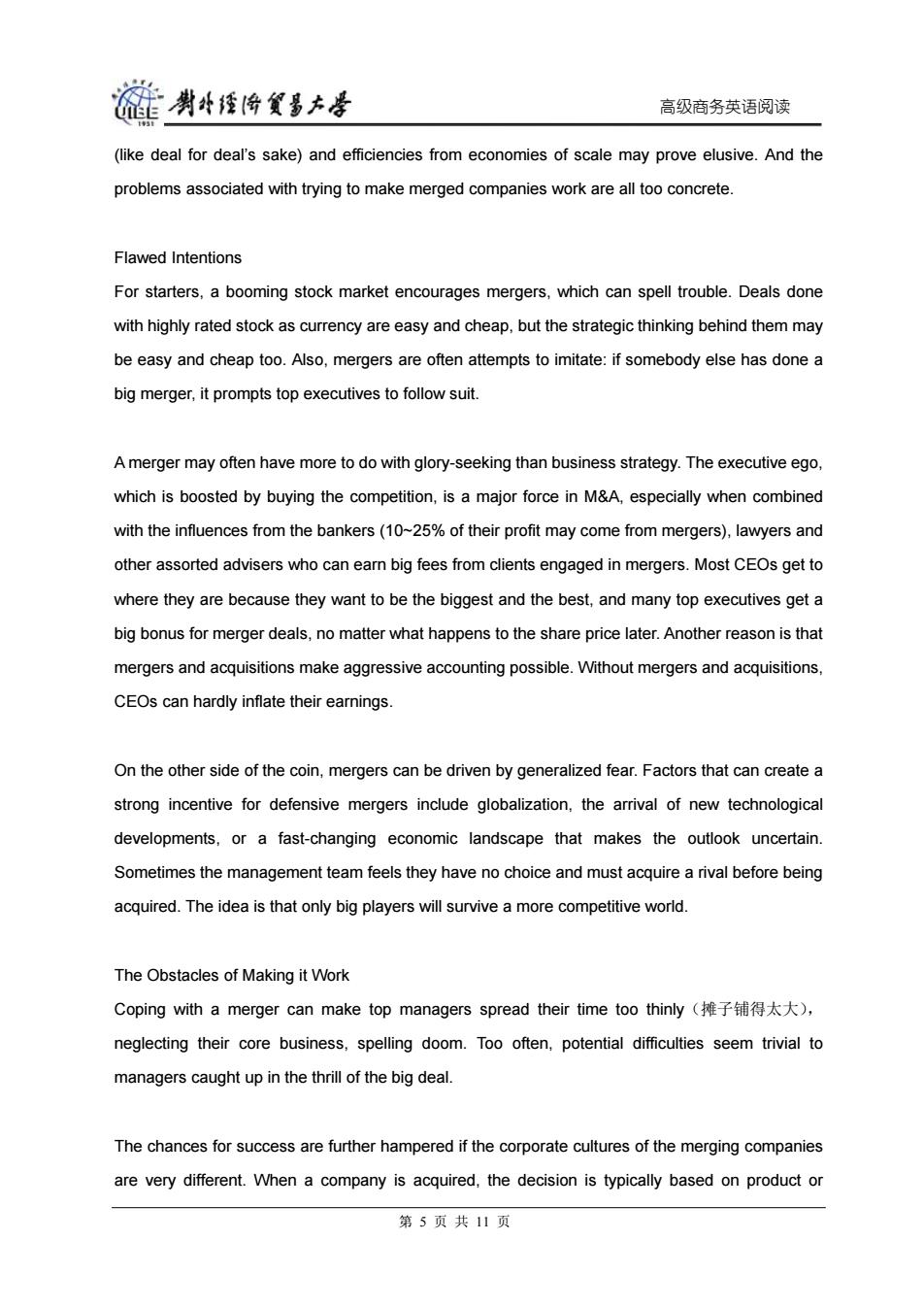正在加载图片...

链喇4哈餐多方孝 高级商务英语阅读 (like deal for deal's sake)and efficiencies from economies of scale may prove elusive.And the problems associated with trying to make merged companies work are all too concrete. Flawed Intentions For starters,a booming stock market encourages mergers,which can spell trouble.Deals done with highly rated stock as currency are easy and cheap,but the strategic thinking behind them may be easy and cheap too.Also,mergers are often attempts to imitate:if somebody else has done a big merger,it prompts top executives to follow suit. A merger may often have more to do with glory-seeking than business strategy.The executive ego, which is boosted by buying the competition,is a major force in M&A,especially when combined with the influences from the bankers(10~25%of their profit may come from mergers),lawyers and other assorted advisers who can earn big fees from clients engaged in mergers.Most CEOs get to where they are because they want to be the biggest and the best,and many top executives get a big bonus for merger deals,no matter what happens to the share price later.Another reason is that mergers and acquisitions make aggressive accounting possible.Without mergers and acquisitions, CEOs can hardly inflate their earnings. On the other side of the coin,mergers can be driven by generalized fear.Factors that can create a strong incentive for defensive mergers include globalization,the arrival of new technological developments,or a fast-changing economic landscape that makes the outlook uncertain. Sometimes the management team feels they have no choice and must acquire a rival before being acquired.The idea is that only big players will survive a more competitive world. The Obstacles of Making it Work Coping with a merger can make top managers spread their time too thinly(摊子铺得太大), neglecting their core business,spelling doom.Too often,potential difficulties seem trivial to managers caught up in the thrill of the big deal. The chances for success are further hampered if the corporate cultures of the merging companies are very different.When a company is acquired,the decision is typically based on product or 第5页共11页高级商务英语阅读 (like deal for deal’s sake) and efficiencies from economies of scale may prove elusive. And the problems associated with trying to make merged companies work are all too concrete. Flawed Intentions For starters, a booming stock market encourages mergers, which can spell trouble. Deals done with highly rated stock as currency are easy and cheap, but the strategic thinking behind them may be easy and cheap too. Also, mergers are often attempts to imitate: if somebody else has done a big merger, it prompts top executives to follow suit. A merger may often have more to do with glory-seeking than business strategy. The executive ego, which is boosted by buying the competition, is a major force in M&A, especially when combined with the influences from the bankers (10~25% of their profit may come from mergers), lawyers and other assorted advisers who can earn big fees from clients engaged in mergers. Most CEOs get to where they are because they want to be the biggest and the best, and many top executives get a big bonus for merger deals, no matter what happens to the share price later. Another reason is that mergers and acquisitions make aggressive accounting possible. Without mergers and acquisitions, CEOs can hardly inflate their earnings. On the other side of the coin, mergers can be driven by generalized fear. Factors that can create a strong incentive for defensive mergers include globalization, the arrival of new technological developments, or a fast-changing economic landscape that makes the outlook uncertain. Sometimes the management team feels they have no choice and must acquire a rival before being acquired. The idea is that only big players will survive a more competitive world. The Obstacles of Making it Work Coping with a merger can make top managers spread their time too thinly(摊子铺得太大), neglecting their core business, spelling doom. Too often, potential difficulties seem trivial to managers caught up in the thrill of the big deal. The chances for success are further hampered if the corporate cultures of the merging companies are very different. When a company is acquired, the decision is typically based on product or 第 5 页 共 11 页